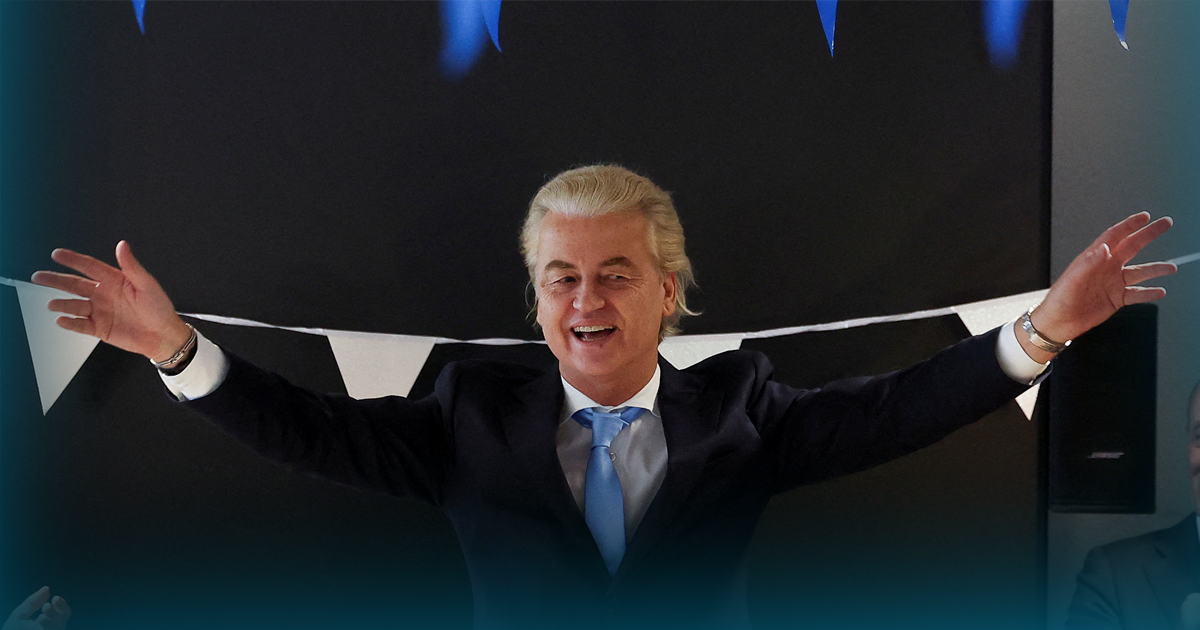The party of the departing prime minister of the Netherlands, Mark Rutte, has said that it would not form a government with the anti-Islamic populist Geert Wilders. Following this week’s unexpected general election results, in which Wilders’ Freedom Party (PVV) won more seats than any other party, coalition negotiations have begun.
Dilan Yeşilgöz-Zegerius, the leader of Rutte’s conservative People’s Party for Freedom and Democracy (VVD), has hinted that they may back Wilders in specific parliamentary votes. They have, nevertheless, disqualified a coalition government with his party.
The head of the nation’s liberal party has cautioned citizens not to be fooled by Wilders’ attempts to look more reasonable when forming a coalition. The election results give Wilders the first chance to unite in a coalition and possibly take over as prime minister in the future. Even if he opposes “Islamic schools, Qur’ans, and mosques, he only has 37 seats out of 150, thus he cannot form a government on his own and will need to persuade potential coalition partners of his competence to lead.
Speaking out against Wilders’ pre-election shift towards moderation was Sigrid Kaag, the Dutch finance minister and leader of the liberal Democrats 66 (D66) party, who is set to resign in the summer of 2019. She said he still had a long way to go and cautioned voters not to be duped by his attempts to come off as less extremist.
Kaag stressed that Wilders’ recent shift in discourse about immigration laws does not take away from his past of making charges, demonizing other people, discriminating against, and excluding particular groups of people.
Prime Minister Should Adopt New Rule
Yeşilgöz-Zegerius stated before the coalition discussions that the VVD should adopt a new role in light of Rutte’s 13 years as prime minister and the party’s election-related seat losses. She did, however, also imply that her party would back positive ideas within a coalition led by Wilders, implying that they might back him on some crucial votes.
Given that parties holding a sizable number of seats typically play hard to get after elections, the VVD’s choice to forgo joining a coalition could also be interpreted as a calculated maneuver.
Surprisingly, Wilders’ party won 37 of 150 seats on Wednesday, more than the VVD (which had 24 seats) and the combined Labour/Green coalition led by the former European Environment Commissioner, Frans Timmermans.
On Friday, Wilders expressed his dissatisfaction over the VVD’s decision not to be included in the next cabinet. He did see some promise, though, in Yeşilgöz’s possible assistance in a few crucial areas.

Since the VVD has withdrawn from coalition talks, attention has turned to Pieter Omtzigt and Timmermans’ Groen Links-PvdA combination. Pieter Omtzigt‘s recently established party, the New Social Contract (NSC), has gained 20 seats. Omtzigt has previously stated his willingness to set aside personal disagreements in order to form a government, while he has not made his views on the process of government formation clear.
He has, meanwhile, also expressed worries about Wilders’ possible influence on the rule of law. Though he hasn’t stated his plans either, Timmermans has hinted that his party would wind up in opposition, casting doubt on the viability of forging a powerful coalition.
The Dutch are used to protracted talks to form coalitions. The last time around, it took an unprecedented 298 days, or over 10 months, to create a government. If Wilders’ attempts fail, other parties might try to form a more centrist alliance in his absence. If a coalition agreement cannot be reached, fresh elections may be called as a final resort.
The Farmer-Citizen Movement (BBB), one of the smaller parties, has declared its intention to work with Wilders in government. They may not need all seven of their seats in the lower house of parliament to form a majority, but they do have a sizable number of senate seats, giving them the ability to stall legislation.
Also Read: The Release Of Hostages From Gaza Will Not Take Place Until Friday


Leave a Reply